Wearables and Quantified Self is an Industry classified by The Data City’s Real Time Industrial Classifications (RTIC). The RTIC includes the following Verticals; Fitness Tracking, Medical, Apps, Enabling Tech, AR/Smart Glasses (NEW), and Industrial Wearables (NEW).
So, how do we keep these RTICs up to date? At The Data City, we carry out two kinds of updates, Annual and Monthly.
Annual Updates AKA “The Big One”
The Annual Update is where the real magic happens. Unlike SIC codes (Standard Industrial Classifications) which haven’t been properly updated for more than a decade (see why this is a major problem here), our RTICs evolve every year.
This yearly refresh helps us show how the UK’s frontier economy is changing right now. It highlights the companies driving innovation and gives a true picture of what’s happening across industries in real time.
Monthly Updates
Our Monthly Updates might not be as big or exciting, but they’re just as important. This is when we add new companies that have joined the industry and remove those that have moved on. It’s a bit like housekeeping. Learn more about the whole process here.
In this case the update was an annual update. We took time to look at how the sector had changed across the year what was happening and how it was happening, this led to the creation of new Verticals (sub sectors) of the industry.
What’s new this time?
First off, for anyone unfamiliar with the industry, ‘Wearables’ are smart gadgets you can wear on your body, like fitness trackers or smartwatches. They help you keep track of things like your heart rate, sleep, steps, and more. Some even give advice to help you stay healthy, get more done, or stay focused.
Wearables can already make your daily life better by boosting your productivity or helping you live a healthier lifestyle, whether you’re at school, at work, or just relaxing.
Second, what does “Quantified Self” mean? It’s a fancy way of saying, using tech to track stuff about yourself. Wearables and Apps collect data like how many steps you take, how many calories you eat, or how well you sleep. Then they turn that data into readable charts or give tips so you can make smart choices about your health and habits.
Third, why should you care about the companies behind this tech? You’ve probably seen someone showing off their new smartwatch or talking about their fancy, futuristic glasses that can give the wearer information about who they are speaking to.
Wearables are everywhere now and they’re only getting more popular as prices drop. Big tech companies are racing to make better, cheaper, and smarter devices. If you know who’s leading the way, you’ll have a better idea of where the tech is headed, and how it might shape your future.
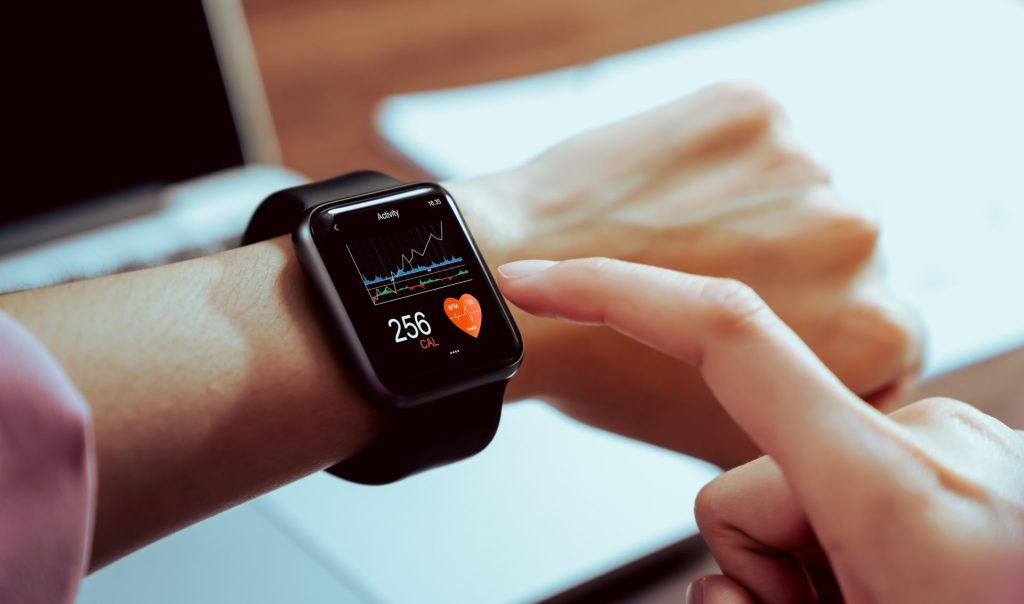
How the RTIC was developed and updated
This RTIC was updated with reference to Samsung’s Benefits of wearable Technology in Business and Iberdrola’s What is a wearable?
Following this we came to the conclusion that there were six clear industries with enough companies in the UK to warrant an RTIC build;
- Apps – Companies developing Apps for self-tracking of data acquired by wearable devices
- Enabling Tech – Companied producing the technologies (i.e., sensors) that enable wearable devices
- Fitness Tracking – Companies manufacturing wearable devices for fitness tracking
- Medical – Companies developing wearable devices for health tracking
- AR/Smart Glasses and Haptic Tech – Glasses that enable people with real-time information to help them with day to day activities and specialised tasks. This Vertical also includes Haptic tech. This is tech that can be worn on the body. The Tech uses forces, vibrations, and motion to recreate the sense of touch in human-computer interactions, providing tactile feedback to a user’s hands, skin, or other parts of the body.
- Industrial wearables – Companies that are providing wearable tech for businesses. Tech like wearable computers or scanners that help improve individuals’ productivity.
What are the new verticals all about?
AR/Smart Glasses and Haptic Tech
Imagine putting on a pair of glasses and seeing directions pop up in front of your eyes. Or feeling a tap on your wrist from a device when it’s time to take a break. Sounds like sci-fi, but it’s real, and it’s happening now.
AR stands for Augmented Reality. That means adding digital stuff to the real world. AR glasses look like normal glasses, but they show extra info like maps, messages, or even game characters in real time, right in front of your eyes.
Haptic tech is all about touch. It’s wearable tech that lets you feel things like vibrations, taps, or pressure. It’s used in gloves, wristbands, or even suits.
And as tech gets smaller and cheaper, you might be wearing AR glasses and haptic gear sooner than you think.
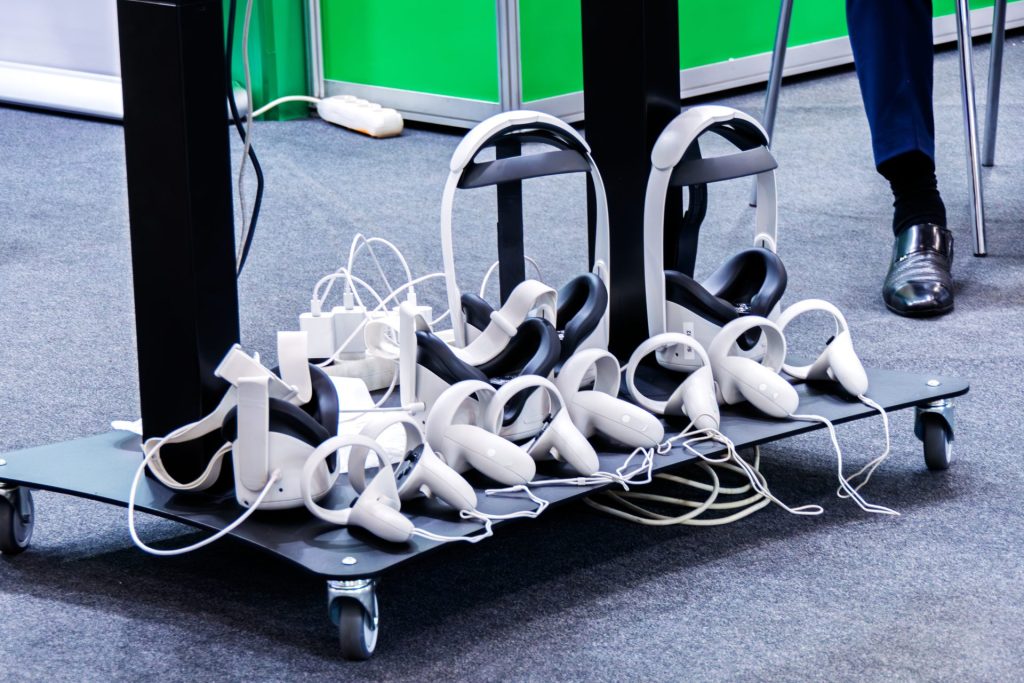
Industrial wearables
You’ve probably seen smartwatches or fitness bands, but did you know businesses use wearable tech too? It’s called Industrial Wearables, and it’s changing how people work in factories, hotels, hospitals, and more.
Notable Industrial Wearables include;
- Wearable computers: Like mini-PCs on your wrist
- Smartwatches: That send alerts, track tasks, or monitor health
- Barcode scanners: That workers wear to scan items quickly
- Safety gear: That tracks location or heart rate to keep people safe
Industrial wearables are making work smarter, safer, and more efficient. As the tech gets better, more companies will use these tools to help their teams do amazing things without being stuck at a desk.
An overview of the Wearables Industry
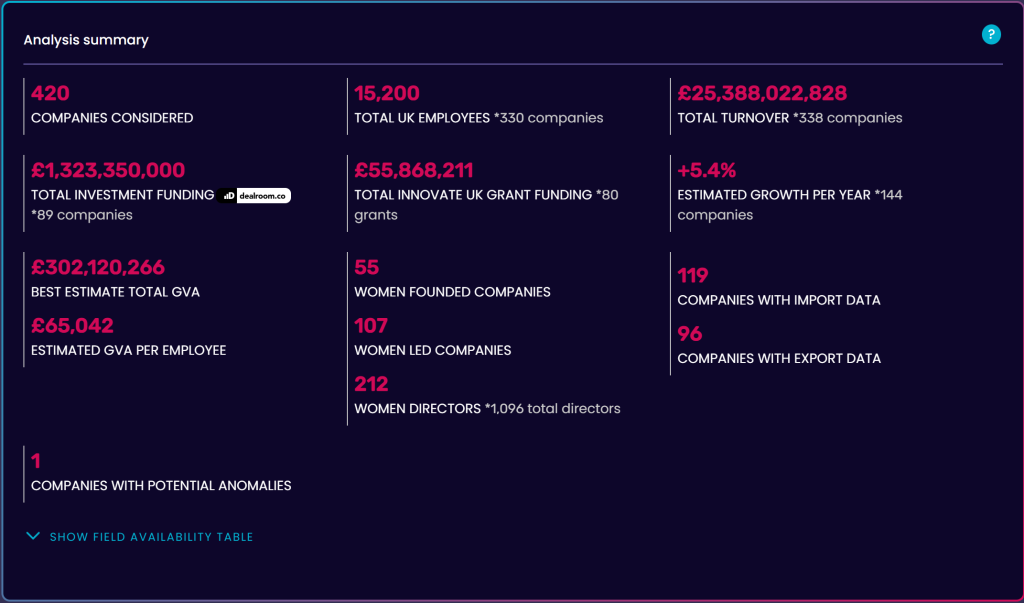
The Industry Engine shows us that there are 420 companies in the sector making a combined £25.38Billion in turnover and 15,200 employees. Not only is this industry a large employer it has an estimated per employee GVA of £65,042 suggesting that it is a highly productive sector.
Note: This sector is highly driven by the inclusion of Microsoft but, as it is a significant player in the industry with their HoloLens it is still included.
Hear are a some of notable companies that we think you should keep an eye on.
Pragmatic Semiconductor Limited
Pragmatic Semiconductor is a UK company. It is recognised as an OECD scale up, a university spin-out and is growing rapidly at 35.1%.
The company makes flexible integrated circuits (FlexICs) – tiny, bendable chips that can be built into everyday objects where normal silicon chips don’t work. Their technology is faster to produce, cheaper, and more eco‑friendly than traditional chips, making it possible to add “smart” features to packaging, clothing, medical devices, and even industrial wearables.
By powering the sensors and enabling tech behind the Wearables and Quantified Self industry, Pragmatic is helping shape a future where almost anything can become connected and intelligent.
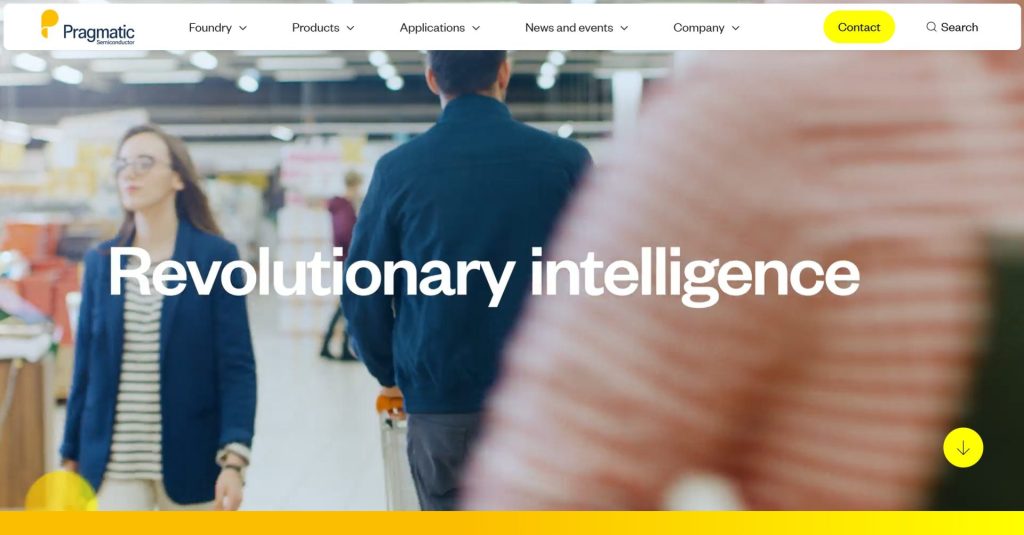
Miteq Limited
MITEQ is a UK company that delivers wearable and mobile technology solutions to help industries work smarter and safer. The company is women lead, a recognised OECD scale-up and is growing fast at 44.8% annual growth.
MITEQ provide tools like barcode scanners, RFID systems, mobile computers, and wearable devices that keep workers connected and make tasks faster and more accurate. Their tech is used in warehouses, hospitals, care homes, and logistics. Beyond hardware, MITEQ also supports businesses with software, setup, and recycling services, making them a full‑service partner. By combining wearables with smart tracking systems, MITEQ plays an important role in the Industrial Wearables sector, helping companies boost productivity.
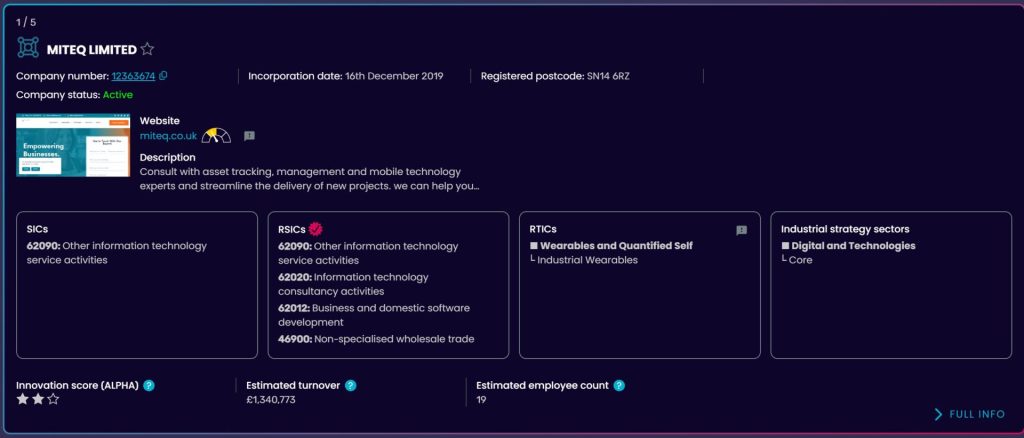
Wave Optics Limited
WaveOptics is a UK company that designs the optical engines behind AR smart glasses. The company is experiencing good growth at 9.3% and was acquired by Snap Inc in 2021 adding to Snaps growing portfolio of AR companies.
Using advanced waveguide technology, WaveOptics can project digital images directly into a wearer’s field of view. Their innovation makes it possible to create affordable AR glasses that overlay maps, messages, or interactive content onto the real world. By solving one of the toughest challenges in augmented reality, how to deliver clear, compact displays. WaveOptics is a key player in the Wearables and Quantified Self industry, helping bring futuristic AR experiences into everyday life.
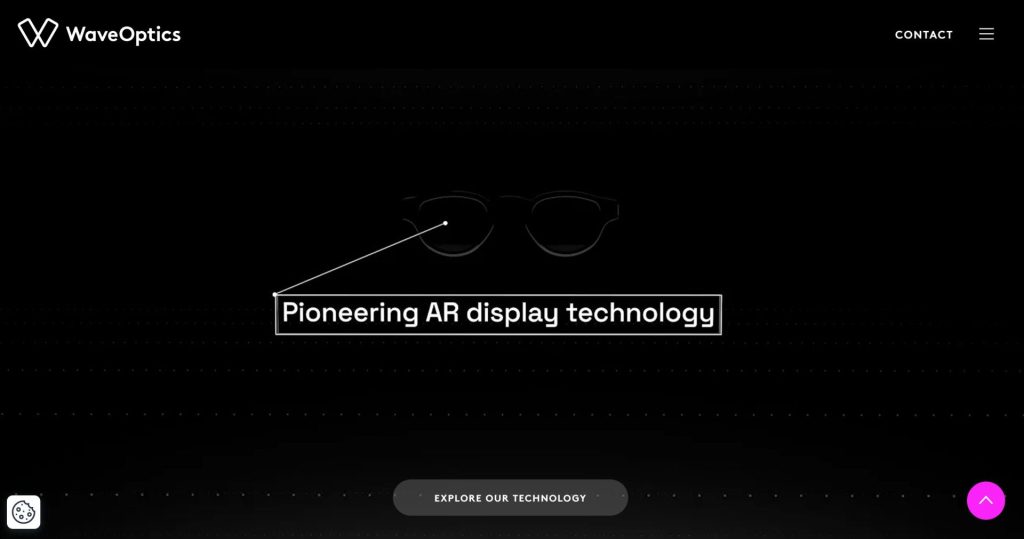
Looking forward
The Wearables and Quantified Self sector are evolving quickly and often in unexpected ways. What began with simple step counters has grown into a complex industry reshaping how we live, work, and understand ourselves.
From emotion sensing glasses to industrial scanners and flexible chips, the landscape is no longer just about tracking, it is about connection, productivity, and insight. That is why it is crucial to have data that evolves with the industry.
At The Data City, we go beyond static SIC codes and outdated classifications. Our platform uses real‑time data, advanced AI models, and continuous updates to build an economic map that reflects the true shape of modern industries as they exist today, not as they were five years ago.
For Wearables and Quantified Self, this means identifying the companies driving innovation, spotting new verticals like AR/Smart Glasses and Industrial Wearables as they emerge, and creating sector definitions that are useful for policymakers, investors, and businesses.
The goal remains the same, to provide a live, accurate, and actionable view of the UK’s dynamic sectors.
Sign up for a free trial and see the data for yourself today.
Please note: The data from The Data City is accurate at the time the article was written but may change over time due to the dynamic, real‑time nature of our data. For the latest insights, visit our platform.


